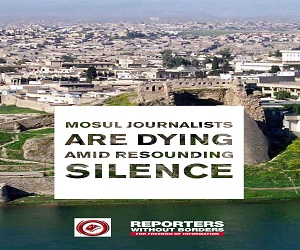JFO Demands That President Talibani Abandon Case against Local Paper
Iraqi journalists and their media institutions in Iraq are exposed to libel suits resulting from their criticism of the performance of some government institutions. 17 such suits were filed against a number of journalists and their institutions on the part of government and security officials. The files of four of the cases are closed, and the rest are still waiting for rulings in the Iraqi courts.
Among these cases is the suit brought by the minister of electricity, Wahid Karim, against the newspaper al-Mada. The suit asks that the paper’s editor in chief pay damages of 20 million Iraqi dinars, as compensation for the effect of damages to his “reputation,” because of what one of the editors of al-Mada wrote based on the remark that “It is hopeless to deal with the problems of electricity,” which was attributed to the minister and published other newspapers.
Al-Mada said that it seems logical to be surprised by this (remark), and to wonder: Is the reputation of the minister harmed more because of the article on an inside page (of the newspaper) in which the editor discusses the claim of hopelessness in addressing the plight of the citizens, or is it damaged more by (the lawsuit) that harms the minister’s reputation, the reputation of the state, and the reputation of Iraq?
While we are talking about surprises, the paper added, we may be surprised to learn that the minister did not know originally that there was a suit raised in his name against al-Mada, seeking compensation of 20 million dinars (approximately 16 thousand dollars) for the damages that affected his reputation.
The Journalistic Freedoms Observatory (JFO) sees in this case an attempt to silence the voices of the free press by pressuring and intimidating it to be wary of what (journalists) publish, or will publish, in all accuracy and credibility.
The Journalistic Freedoms Observatory demands that the minister of electricity respect the freedom to express opinions, and that he accept the professional criticisms of the press, which represents a place where the Iraqi citizen can air his views, and that he distance himself from the pressures that threaten to push the institutions of the press into paying compensation, or threaten to convict the writer of an article or investigative report. JFO demands that the minister safeguard democracy and freedom of expression, and the right of the citizen to obtain information, a sacred right that cannot be abandoned, as journalists are still paying with their lives to preserve their rights and the rights of the Iraqi citizen.
Earlier, al-Mada won a court case that was brought against it last year on the part of the Independent Elections Commission after the newspaper revealed administrative corruption in the commission, and which was considered at the time a victory for the press. The newspaper throughout its reporting was able to reveal corruption and embezzlement of funds on the part of some officials to the courts.
Among the suits that the courts ruled on, with negative results, were the sentencing of our colleague Kamal al-Sayyid Qadir to a 30-year sentence by the court in the city of Irbil last year, on the basis of his criticisms of a number of officials in the regional government, mostly around issues of corruption and nepotism. (The sentence) was lifted after the president of the Iraqi Kurdistan region, Masoud al-Barzani, issued a pardon, which granted his release.
Whereas JFO is still waiting for the Iraqi President Jalal al-Talibani to order the cessation of a suit filed by his office against our colleague Narmin al-Mufti, the editor in chief of the newspaper al-Qal'a.
The suit was brought against the al-Qal'a after it published, in its 34th edition, details on the salaries of workers in the presidency of the republic, which the presidency hastened to deny in a response distributed to the media. Al-Qal'a published the text of this response and the denials, and the editorial committee of the newspaper, under al-Mufti’s supervision opened an investigation with her correspondent who had reported the story. According to what the editor in chief of al-Qal'a said to the JFO, after the determination that the correspondent Salim Hamid Fa’iq had not adhered to the integrity and ethics of the profession, causing embarrassment to the newspaper with the presidency of the republic, the correspondent was dismissed from his work by an official written notice bearing the signature of the editor in chief of the newspaper.
As such, the JFO hopes that the president of the republic, Jalal al-Talibani will drop the legal suit against al-Qal'a, after its commitment to the ethics of the profession and its decisions to prevent any professional failings.
The article was translated by www.iraqslogger.com






.jpg)









